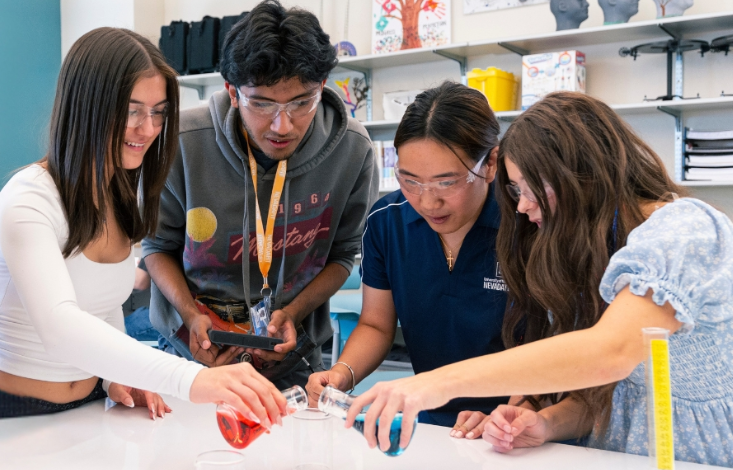How to Get Scholarship Abroad Easily: Practical Tips for Indonesian Students

Studying abroad is a dream for many Indonesian students because it allows them to experience new cultures, receive a quality education, and improve their career opportunities. Many students think getting a scholarship abroad is too difficult, but with the right preparation and knowing how to get scholarship abroad, it is completely possible to secure one.
In this article, we’ll break down how to easily obtain a scholarship abroad, providing practical steps for Indonesian students.
Why Studying Abroad Is More Accessible Today
Studying abroad is becoming increasingly accessible for Indonesian students due to three key factors:
- More Scholarships: Programs such as LPDP, Chevening, MEXT, Erasmus Mundus, and Fulbright provide funding for tuition, living expenses, and travel, making studying overseas more affordable.
- Government and Global Support: The Indonesian government, along with international organizations, offers scholarships and exchange programs that enable students to attend top universities while developing leadership skills.
- Online Resources and Networks: The internet, social media communities, and alumni networks offer information, guidance, and mentorship, helping students navigate applications and prepare for studying abroad.
These developments make international education more attainable and create exciting opportunities for Indonesian students.
Types of Scholarships Indonesian Students Can Apply For
Indonesian students who wish to study abroad have access to various types of scholarships, depending on their academic achievements, financial needs, and career goals. Here’s an overview:
Merit-Based Scholarships
These are awarded for academic excellence, achievements, or special talents. They often cover full tuition and living costs. Examples include:
- UECFOCS (Taiwan): Indonesian students of Chinese descent apply to several Taiwanese universities, with scholarships covering tuition and living costs.
- LPDP (Indonesia): Full funding for graduate studies at home or abroad.
- Chevening (UK): Full scholarships for a one-year master’s degree, focusing on leadership.
- MEXT (Japan): Supports undergrad, master’s, and PhD studies.
- Erasmus Mundus (EU): Joint master’s degrees across European countries.
- Fulbright (USA): Full funding for graduate studies in the U.S.
- Taiwan Government Scholarship: Supports higher education in Taiwan.
Need-Based Scholarships
These help students who need financial support. They may cover partial or full tuition and living expenses. Examples:
- Australia Awards Scholarships: Full scholarships for students from developing countries, including Indonesia.
- SIT Study Abroad Grants: SIT Study Abroad Grants are need-based scholarships that help cover tuition and program costs, making international study more accessible for students with financial need.
Government-Funded Programs
Governments offer scholarships to promote international education and partnerships. Examples:
- Kominfo Scholarship (Indonesia): For master’s studies in countries like China, India, the Netherlands, Hungary, and Japan.
- Indonesia Maju Scholarship (BIM): Undergraduate preparation abroad with a focus on social projects.
- Fulbright U.S. Student Program: Grants for master’s and PhD studies in the U.S.
University and Private Scholarships
Universities and private institutions also provide scholarships to attract international students. Examples:
- University-Specific Scholarships: University-specific scholarships help attract international students by covering tuition, living costs, or other expenses. Check each university’s requirements and application process.
- Private Foundation Scholarships: Private foundation scholarships fund students studying abroad and may cover tuition, living expenses, and travel. They also offer networking, mentorship, and professional development opportunities.
Exploring different scholarship types helps Indonesian students find opportunities that fit their goals and finances. Checking eligibility and deadlines is key to increasing success.
See also: Student Group Tours: Transforming Education Through Immersive Travel
How to Get a Scholarship Abroad Easily: Practical Tips
Getting a scholarship to study abroad is a major step toward achieving your academic and career goals. Follow these practical steps:
Start Research Early
Begin searching for scholarships at least 12 months before your intended departure. This allows time to find programs that match your interests, understand their requirements, and prepare necessary documents. Use official university websites and reputable scholarship databases.
Focus on Eligibility
Apply only to scholarships you qualify for. Use a spreadsheet to track each scholarship’s requirements and deadlines. Staying organized helps you avoid wasting time on applications you’re unlikely to succeed in.
Prepare Strong Application Documents
Statement of Purpose (SOP): Clearly explain your academic interests, career goals, and why you chose the specific program and university.
Academic Transcripts: Ensure your records are accurate and up to date.
Recommendation Letters: Obtain strong references from professors or professionals who know your abilities and character.
Language Test Scores: Prepare for required exams like IELTS, TOEFL, or JLPT, depending on the scholarship.
Highlight Extracurricular Activities and Leadership
Show your involvement in clubs, volunteering, or internships. Leadership and teamwork experiences make your application stand out.
Apply to Multiple Scholarships
Increase your chances by applying to several scholarships. Tailor each application to the specific requirements of the program.
Practice for Interviews
Prepare by practicing common interview questions. Seek feedback from mentors or peers. Being well-prepared demonstrates your enthusiasm and suitability for the scholarship.
By following these steps, Indonesian students can significantly improve their chances of winning a scholarship abroad. Stay organized, meet deadlines, and present yourself confidently and authentically.
Common Mistakes That Make Scholarships Harder to Get
Applying for scholarships can be competitive, and even small mistakes can lower your chances. Here are some common pitfalls to avoid:
Waiting Until the Last Minute
Procrastination can lead to rushed applications with errors or missing information. Start at least 6 to 12 months before the deadline to gather documents, write strong essays, and review your application carefully.
Submitting Generic Statements of Purpose (SOPs)
A generic SOP doesn’t stand out. Customize each SOP to reflect your experiences, goals, and how they match the scholarship. Avoid using the same essay for multiple applications.
Ignoring Smaller or Local Scholarships
Many students focus only on large, well-known scholarships. Smaller or local scholarships usually have fewer applicants, making them easier to win. Combining several smaller scholarships can also help cover costs.
Not Meeting Language Requirements
Scholarships often require language test scores such as IELTS, TOEFL, or JLPT. Make sure to prepare and take these tests early. Careful preparation and attention to detail can significantly improve your chances of success.
Extra Success Strategies for 2025 and Beyond
Getting a scholarship to study abroad is competitive, but you can improve your chances by using these strategies:
Network with Alumni and Scholarship Communities
Connect with scholarship alumni and communities in Indonesia. The Embassy in Indonesia has events and programs that help students build personal and professional connections. These networks offer guidance, mentorship, and opportunities for collaboration.
Build an Online Academic Portfolio
Create an online portfolio to showcase your achievements. Include:
- Updated CV: Education, experiences, and skills.
- Research Interests: Your academic focus and curiosity.
- Publications and Projects: Contributions to your field.
- Professional Profiles: Include links to platforms to showcase your skills, projects, and professional experience.
Resources and guides can help you make an effective portfolio.
Pursue Short Online Certifications
Taking short online courses and earning certifications can strengthen your scholarship application. Platforms like Google Career Certificates offer programs such as IT support, data analytics, project management, and more. Completing these courses demonstrates your dedication to continuous learning and professional development.
Stay Consistent with Deadlines and Applications
Always meet scholarship deadlines. Use a calendar to track applications and submissions. Applying to multiple scholarships can also increase your chances of success.
By following these strategies, Indonesian students can strengthen their applications and improve their chances of studying abroad.





